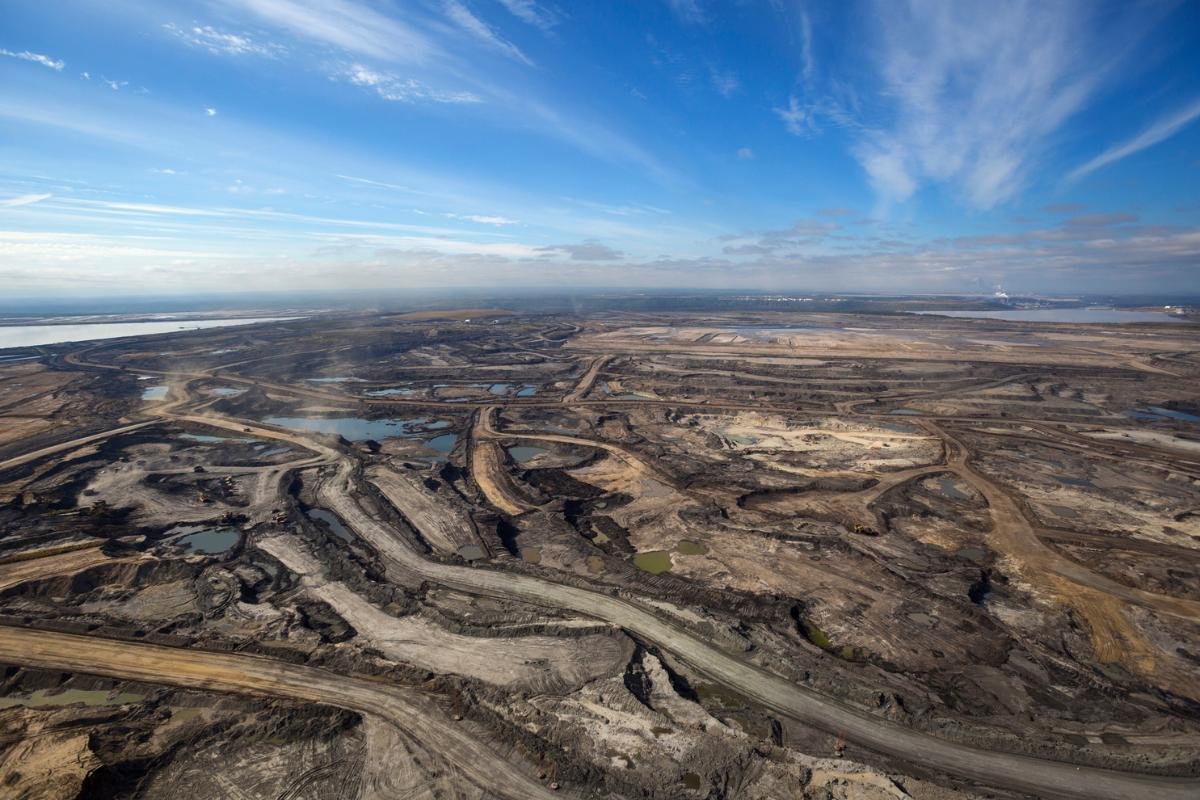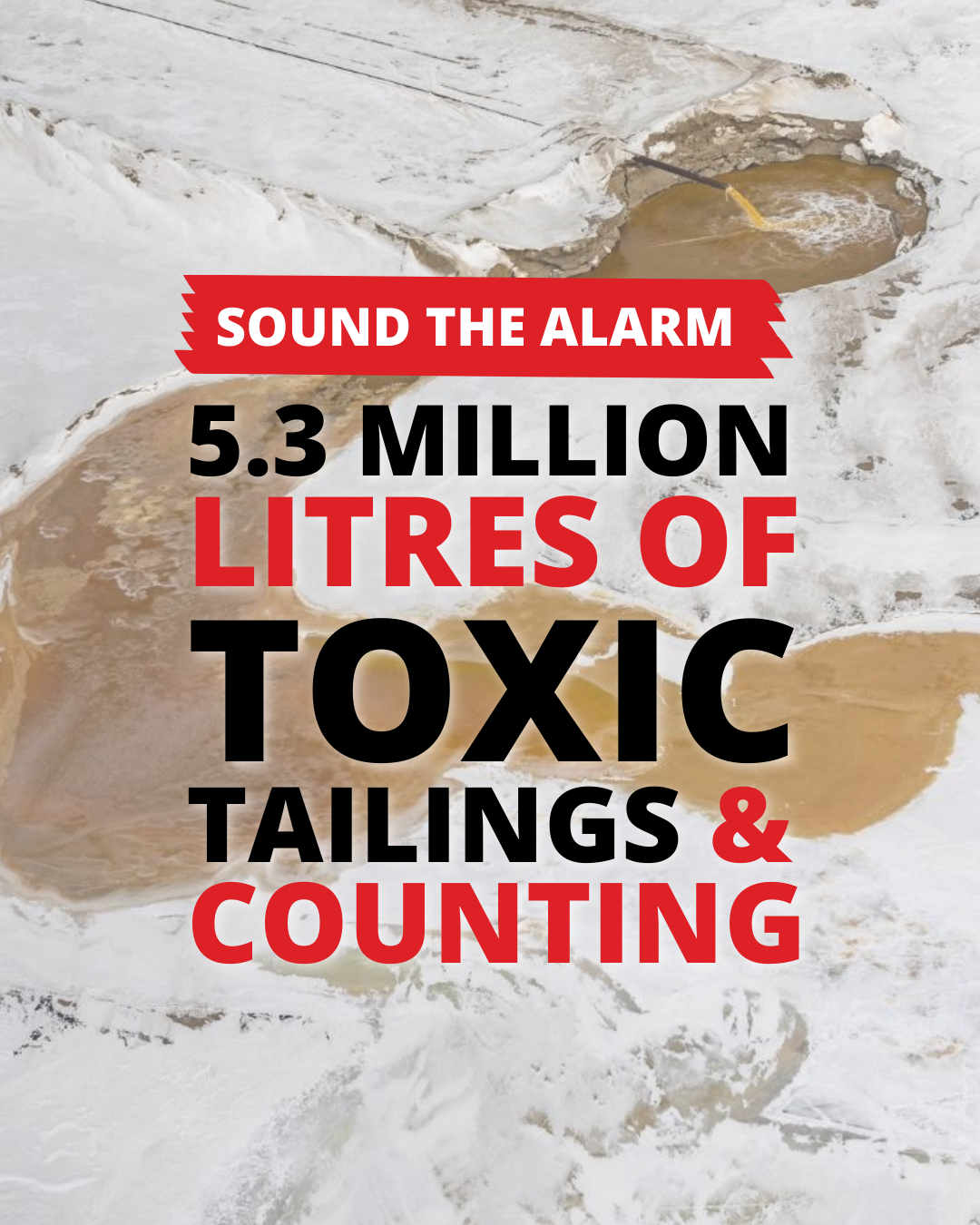
Clean Up Toxic Tailings
Indigenous Climate Action (ICA) has joined Keepers of the Water, Environmental Defence, and 12+ other organizations to stand alongside Indigenous Nations impacted by the recent Imperial Oil Disaster. Together, we are calling on federal and provincial governments to address on-going environmental racism and the irresponsible management of toxic wastewater in the tar sands.
Take Action
Sign the letter to urge both the federal and provincial governments to hold industry accountable.
Imperial Oil Disaster
On March 2, 2023 the Athabasca Chipewyan First Nation (ACFN) issued a press statement describing the impacts of a major spill and ongoing leaking of toxic tailings containment at Imperial’s Kearl mine into the Athabasca watershed. The incident allowed an unknown volume of tailings to seep into muskeg and over 5.3 million litres of toxic wastewater to spill from its Kearl facility into the environment. While Imperial and the Alberta Energy Regulator (AER) were aware of these issues since at least May of 2022, no notice was provided to ACFN or other Indigenous Nations downstream. The disaster exemplifies on-going environmental racism in the area and dangers the toxic tailings pose to communities and entire ecosystems.
The Imperial Oil disaster is not an isolated incident. It is the latest example of a systemic failure by so-called Canadian governments to hold companies accountable for their obligations towards downstream Indigenous nations and the environment. It is also a clear example of on-going environmental racism against our people.
ENVI Standing Committee
Indigenous nations downstream of the tar sands appeared at the Standing Committee on Environment and Sustainable Development (ENVI) on April 17, 2023, to speak to the Imperial Oil’s Kearl tailings ponds leaching into the environment.
“This incident has downstream Indigenous communities both in Alberta and residents of the North question if there is an isolated problem or a systemic issue throughout the oil sands. When I say a systemic issue, I talk about systemic racism in regards to first nations communities downstream because if this was in Calgary I guarantee you guys would be crying and yelling by the bottom of your lungs not me here today.” - Chief Allan Adams, ACFN
Support Impacted Nations & Hold Industry Accountable
Indigenous Climate Action, Keepers of the Water, and Environmental Defence along with 12+ organizations from across the country sent a letter to Prime Minister Trudeau and the Alberta government calling for action and accountability for the disaster.
In the immediate term, we demand The Governments of so-called Alberta and Canada:
Remove barriers to Indigenous nations’ access to compliance reporting, data, and sites for environmental sample collections for all tar sands projects and provide capacity funding for a detailed review.
Require Imperial to seal their berm to prevent seepage off-site.
Implement a downstream testing program that continues after the spring thaw.
Provide funding for a comprehensive and Indigenous-led health study into the high incidence of rare cancers in Fort Chipewyan.
Shut down production at Imperial Oil’s Kearl facility. Establish a process to ensure that all impacted Indigenous nations’ Free, Prior and Informed Consent (FPIC) is required before Imperial Oil can restart production, based on proof their industrial waste water is not reaching or at risk of reaching the environment.
Place an immediate moratorium on any expansion of tar sands mining, such as new mines and extensions to existing projects.
Charge Imperial Oil and other tar sands operators whose tailings ponds are leaking under the federal Fisheries Act and relevant sections of the Environmental Protection and Enhancement Act.
Ensure the Federal government issues a Fisheries Act Section 37(1) order to each tar sands operator to submit its environmental management system (EMS) for review.
In the near term, we demand The Governments of so-called Alberta and Canada:
Hold a public inquiry into the current state of impacts from tar sands operations and tailings ponds, including the human health, ecological, and economic impacts, as well as the structural integrity of all tailings ponds.
Guarantee that current and future mitigative actions by industry and regulators must have the Free, Prior and Informed Consent (FPIC) of all impacted Indigenous nations.
Ensure each tar sands operator has a comprehensive tailings reclamation plan that incorporates Western science and Indigenous knowledge, with the goal of fully remediating and reclaiming tailings impoundments while preventing any release of toxins into the environment. These plans should be approved by affected Indigenous nations and be publicly accessible.
Secure from tar sands operators adequate security deposits in trust accounts to implement tailings “ponds” clean-up plans and finance the environmental remediation of mine sites.
Increase the fines for violations of environmental regulations by tar sands companies.
Ensure full public disclosure of the findings of the Alberta Information Commissioner’s investigation into whether the AER violated the law by failing to inform affected Indigenous nations, communities, and the public of the seepage from the Imperial Oil Kearl tar sands mine tailings lakes.
Abandon plans to release treated tailings into the Athabasca River watershed.
Dismantle the Alberta Energy Regulator and develop an independent regulatory system in which the decision-making authority is shared with the impacted Indigenous nations.
About Alberta’s Toxic Tailings
Oil companies are currently licensed to withdraw over 590,000,000 cubic metres of water per year from the Athabasca River for oil sands mining operations. This is roughly the equivalent water use of a city of 3 million people, but this water does not get returned to the river system because following the mining process it becomes a toxic brew of water, sand, silt and petrochemical waste products. Instead, the toxic waste water is retained in giant lakes referred to as “tailing ponds” that now span over 250 square kilometers and hold over 1.18 trillion litres - posing serious risk to the water, land, people and environment in the surrounding area.











